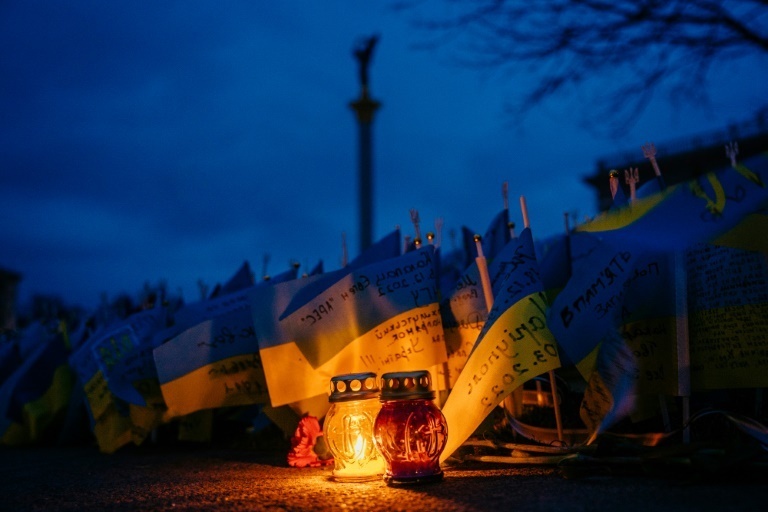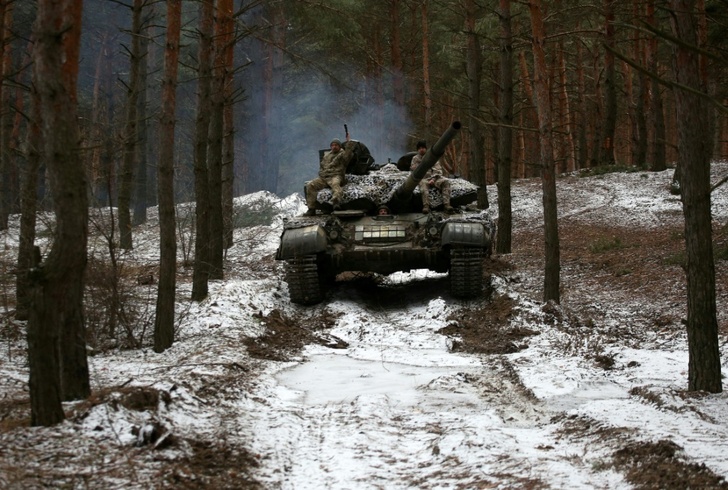A joke about his mother's reaction to air raids gets a laugh of recognition for Anton Boldyrev as the young Ukrainian comedian performs stand-up at a Kyiv club.
"My mom calls and asks: 'Where are you?' I'm like, 'Metro Arsenalna'," he says, referring to the deepest station in Kyiv over 105 metres (340 feet) below ground.
"She says 'You need to go down deeper'," Boldyrev tells the crowd of around a hundred people.
Then "I ask her where she is (and she says): 'I'm in the village and the signal is bad, so I've gone up to the attic.'"
Laughter fills the large dimly lit bar, packed with couples and groups of friends enjoying pizzas and beers as they watch the performers.
Despite the fighting raging in the country's east and south and relentless aerial attacks, Ukrainians -- who in 2019 elected former comedian Volodymyr Zelensky as president -- are already flocking back to stand-up nights.
The event's producer Ivan Zhornokley, wearing a t-shirt with the slogan "Words are our weapons", says he was initially worried people would not come back when he relaunched comedy nights in May.
"Is this appropriate or not?", Zhornokley remembers wondering.
But "it seems the time was right, actually," the 30-year-old says. "We're laughing -- that means we're not surrendering."
- 'Not surrendering' -
Zhornokley now organises around 20 comedy nights per month through his "Ukrainian Stand Up Agency" and donates some of the profits to the military.
The organisers have had to adapt to wartime constraints.
Some events take place in underground shelters, and bars hosting events need generators to deal with frequent power cuts due to Russian strikes on energy infrastructure.

But on the ground, Ukraine is far from victory, and both audience members and comedians say the threat of Russia is always at the back of their minds.
"My humour is built on my personal experiences. And because the war absorbs our lives, my jokes also revolve around it," says 26-year-old comedian Maryna Voytsekhovska.
She first performed stand-up two years ago, but her deadpan humour is already well-honed and her YouTube videos gain thousands of views.
- Less carefree -
Among her favourite topics are the endless checkpoints Ukrainians have to go through when travelling around their country.
"Because I look friendly and speak Ukrainian well, (soldiers) very rarely ask to check my documents," she says, since speaking Russian is more likely to prompt suspicion.
"When I went back to my home village, the only person who asked to see my ID papers at the checkpoint... was my ex-husband, who wanted to know if I'd changed my surname after our divorce!"
Others see stand-up as a form of escapism.
Stand-up comic Ramyl Yangulov tells AFP he tries to avoid talking about the war as much as possible, instead using humour to remind the audience that "life goes on".
"Otherwise, people shut themselves down. Ukrainians aren't in the habit of going to psychologists when something is wrong," says the 33-year-old.
In the audience watching him is 30-year-old Tetyana, who says she has come for some "romantic time" with her husband.
"It's also an opportunity to hear about, talk about and laugh about something other than the war," says Tetyana, who declines to give her surname.
"Humour pushes people towards living. This way at least, we can take a break from our problems and breathe," she says.
Yet one thing is for sure: One year after the Russian invasion, the humour has become less carefree.
"We no longer want to laugh just for the sake of it. We want to share our pain and our worries," says producer Zhornokley.
tbm-brw/am/dhc
© Agence France-Presse
Your content is great. However, if any of the content contained herein violates any rights of yours, including those of copyright, please contact us immediately by e-mail at media[@]kissrpr.com.
Source: Story.KISSPR.com

